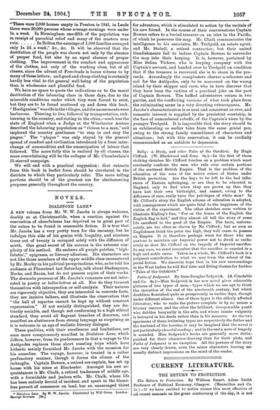DIALSTONE LINE.*
A. NEW volume from Mr. W. W. Jacobs is always welcome, doubly so at Christmastide, when a reaction against the convention of cheerfulness has deprived us in great part of the solace to be found in seasonable fiction. It is true that Mr. Jacobs has a very pretty turn for the uncanny, but he indulges this side of his genius with frugality, and nineteen times out of twenty is occupied solely with the diffusion of mirth. One great secret of his success is the extreme sim- plicity of his method. He eschews all purple patches, " high- falutin'," epigrams, or literary allusions. His characters are not like those members of the upper middle class encountered by Mr. Morley in his political peregrinations, who, as he told his audience at Plum stead last Saturday, talk about Shakespeare, Burke, and Bacon, but do not possess copies of their works. The dramatis personae of Mr. Jacobs's romances are not inter- ested in poetry or belles-lettres at all. Nor do they torment themselves with introspection or self-analysis. Their natures are rigorously objective, they are interested in concrete facts, they are incisive talkers, and illustrate the observation that " the ball of repartee cannot be kept up without constant repercussion." If not socially distinguished, they are dis- tinctly sociable, and though not conforming to a high ethical standard, they avoid all flagrant breaches of decorum, and manifest an abstinence from strong language as surprising as it is welcome in an age of realistic literary dialogue.
These qualities, with their excellences and limitations, are once more conspicuously manifest in Dialstone Lane, which differs, however, from its predecessors in that a voyage to the Antipodes replaces those short coasting trips which have hitherto mainly furnished Mr. Jacobs with the occasion for his comedies. The voyage, however, is treated in a rather perfunctory manner, though it forms the climax of the imbroglio. Captain Bowers, a retired sea-captain, has set up house with his niece at Binchester. Amongst his new ac- quaintances is Mr. Chalk, a retired tradesman of middle age, with a formidable and jealous wife. Mr. Chalk, whose life has been entirely devoid of incident, and spent in the blame- less pursuit of commerce on land, has an unassuaged thirst • Diaistone Lane. By W. W. Jacobs. Illustrated by Will Owen. London: George Newnos. [135.] for adventure, which is stimulated to action by the recitals of his new friend. In the course of their conversations Captain Bowers refers to a buried treasure on an islet in the Pacific, of which be possesses the map. Mr. Chalk communicates the intelligence to his associates, Mr. Tredgold, an estate agent, and Mr. Stobell, a retired contractor ; but their united blandishments fail to induce Captain Bowers to surrender the map into their keeping. It is, however, purloined by Miss Selina Vickers, who is keeping company with the Captain's servant, and handed over to Tredgold on condition that if the treasure is recovered she is to share in the pro- ceeds. Accordingly the conspirators charter a schooner and sail for the Antipodes, only to be marooned on the wrong island by their skipper and crew, who in turn discover that they have been the victims of a practical joke on the part of Captain Bowers. The baffled adventurers return in two parties, and the conflicting versions of what took place form the culminating scene in a very diverting extravaganza. Mr. Jacobs's characterisation is as neat and consistent as ever, and romantic interest is supplied by the persistent courtship, in the face of unnumbered rebuffs, of the Captain's niece by the younger Tredgold. It is impossible that the story should be as exhilarating as earlier tales from the same genial pen, owing to the strong family resemblance of characters and situations ; but with this reservation, it can be cordially recommended as an antidote to depression.


































 Previous page
Previous page